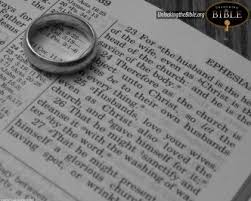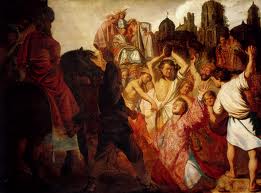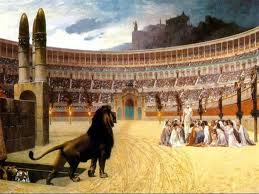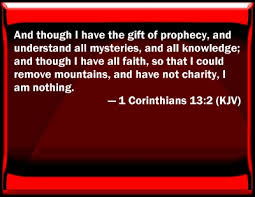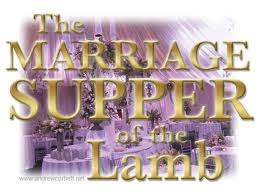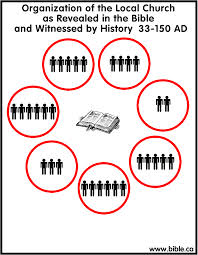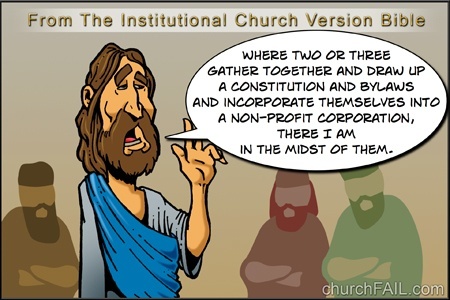Jerald Finney
Copyright © November 6, 2017
 Endnote 1 gives James Madison’s objections to a bill that would have incorporated a church in federal jurisdiction which he included with his veto and links to the whole story concerning that matter.
Endnote 1 gives James Madison’s objections to a bill that would have incorporated a church in federal jurisdiction which he included with his veto and links to the whole story concerning that matter.
Endnote 2 quotes some court cases, with online links directly to those cases, on church incorporation and other matters. One case explains that, with an incorporated church, as opposed to a church which is not a legal entity, there are two entities, the one spiritual and the other legal. Another court in WATSON v. JONES, 80 U.S. 679 (____), 13 Wall. 679. Supreme Court of the United States, concludes that it has no jurisdiction over the matter. The important thing to notice is that the authority is the court. Since the church contracted with the state by incorporating, the members (individual or groups of members) can go to their authority not only for resolution of disputes but also for decision as to whether the authority has jurisdiction. A member can sue a member, members, the church or the state; members can sue a member, members, the church, or the state; the church can sue a member or members, etc. The contract makes clear that the controlling party is the state.
Endnote 3 briefly explains the meaning of “the church” as used in the Bible and in this article.
What is a Church, and What Upholds Her Integrity?
Christ’s church or assembly was a mystery that was not revealed in the Old Testament; it was “kept secret since the world began, But is now made manifest, and by the scriptures of the prophets, according to the commandment of the everlasting God, made known to all nations for the obedience of faith” (Ro. 16.25-26; see also, Ep. 2.9, 3.9). Jesus announced it and the Epistles of the Apostle Paul explained it. That the Gentiles were to be saved was no mystery (Ro. 9.24-33, 10.19-21). The mystery “hid in God” was the divine purpose to make of Jew and Gentile a wholly new thing—the institution of the church to be manifested in local New Testament churches until the marriage of the lamb (Heb. 12.22-24; Re. 19.7-10)—Christ’s body. In the church, and in the church only, the distinction between Jew and Gentile disappears, and there is one “new man,” the church where there is neither Greek nor Jew, circucmcision nor uncircumcision, Barbarian, Scythian, bond nor free: but Christ is all, and in all.” (Ep. 2.14, 15; Col. 3.10, 11). The revelation of this mystery which was foretold but not explained by Christ (Mt. 16.18) was committed to the Apostle Paul. God “made known unto us [believers together with Christ in a local church body] the mystery of his will, according to his will, according to his good pleasure which he hath proposed in himself” (Ep. 1.9, 2.5-6).
Our Lord announced the purpose of His churches, His assemblies, but wholly without explanation as to how, when, or of what materials, those churches should be built, or what should be their position, relationships, privileges or duties. The Epistles of Paul develop the doctrine of the church. In those epistles, the New Testament church, the “mystery which from the beginning of the world hath been hid in God” (Ep. 3.9), is fully revealed, and fully instructed as to her unique place in the counsels and purposes of God. Through Paul alone we know that a church is not an organization, but an organism, the body of Christ, instinct with His life, and heavenly in calling, promise, and destiny. Through him alone we know the nature, purpose, and form of organization of local churches, and the right conduct of such gatherings. This article will not address all those facets of a church, but will concentrate on the nature of a local church body.
The Apostle Paul was a man well educated in earthly and temporal matters before his salvation. As an apostle, Paul rejected his worldly wisdom gained in “higher education.” Before his conversion, he studied in Tarsus under Gamaliel (Ac. 22.3). He was a Pharisee of Pharisees.
- “Tarsus was actually the center of Greek learning to that day. The finest Greek university in Paul’s day was in Tarsus, not in Athens or Corinth which had passed their zenith. Tarsus was a thriving Greek city and an educational center…. Undoubtedly Paul had been brought up in that university in Tarsus and had a Greek background, but he had also been in Jerusalem where he had studied under Gamaliel. He had worked on his doctorate in Jerusalem under the outstanding scholar of that day, Gamaliel.” (J. Vernon McGee, Acts, Volume II (Pasadena, California: Thru the Bible Books, 1984), p. 258)
Despite his worldly education, which he obtained before his conversion, Paul declared:
- “And I, brethren, when I came to you, came not with excellency of speech or of wisdom, declaring unto you the testimony of God. For I determined not to know any thing among you, save Jesus Christ, and him crucified. And I was with you in weakness, and in fear, and in much trembling. And my speech and my preaching was not with enticing words of man’s wisdom, but in demonstration of the Spirit and of power. Howbeit we speak wisdom among them that are perfect: yet not the wisdom of this world, nor of the princes of this world, that come to nought: But we speak the wisdom of God in a mystery, even the hidden wisdom, which God ordained before the world unto our glory: Which none of the princes of this world knew: for had they known it, they would not have crucified the Lord of glory. But as it is written, Eye hath not seen, nor ear heard, neither have entered into the heart of man, the things which God hath prepared for them that love him. But God hath revealed them to us by his Spirit: for the Spirit searcheth all things, yea, the deep things of God. For what man knoweth the things of a man, save the spirit of man which is in him? even so the things of God knoweth no man, but the Spirit of God. Now we have received, not the spirit of the world, but the spirit which is of God; that we might know the things that are freely given to us of God. Which things also we speak, not in the words which man’s wisdom teacheth, but which the Holy Ghost teacheth; comparing spiritual things with spiritual. But the natural man receiveth not the things of the Spirit of God: for they are foolishness unto him: neither can he know them, because they are spiritually discerned. But he that is spiritual judgeth all things, yet he himself is judged of no man. For who hath known the mind of the Lord, that he may instruct him? But we have the mind of Christ” (1 Co. 2.1-16) [Bold emphasis mine].
Thus Paul first made clear that, as a spiritual man called as an Apostle, he discarded his worldly education gained as a lost carnal man. After he got saved he relied only upon his knowledge of God; and he made clear that only the born-again believer, led by the Spirit, was qualified to handle spiritual matters. Paul also asserted that rulers, “the princes of this world,” do not possess spiritual wisdom, indicating that most leaders are not Christians (undoubtedly, almost all leaders, and almost all leaders of civil government when he wrote the above words, are not and were not Christians) and are blind to spiritual matters.
Persecuted Christians down through the ages have understood this and therefore have refused, even under penalty of torture, imprisonment, and/or death to submit the church and spiritual matters to the ungodly. This was especially apparent under the Roman Empire at the time of Christ and after. See The Trail of Blood of the Martyrs of Jesus.
- “Scripture and all history tell us, that those Caesars were not only arrogant, without God, without Christ, &c.; but professed worshippers, or maintainers, of the Roman gods or devils; as also notorious for all sorts of wickedness; and lastly, cruel and bloody lions and tigers toward the Christians for many hundred years.
- “Hence I [Roger Williams] argue from the wisdom, love, and faithfulness of the Lord Jesus in his house, it was impossible that he should appoint such ignorant, such idolatrous, such wicked, and such cruel persons to be his chief officers and deputy lieutenants under himself to keep the worship of God, to guard his church, his wife. No wise and loving father was ever known to put his child, no not his beasts, dogs, or swine, but unto fitting keepers.
- “Men judge it matter of high complaint, that the records of parliament, the king’s children, the Tower of London, the great seal, should be committed to unworthy keepers! And can it be, without high blasphemy, conceived that the Lord Jesus should commit his sheep, his children, yea, his spouse, his thousand shields and bucklers in the tower of his church, and lastly, his great and glorious broad seals of baptism and his supper, to be preserved pure in their administrations—I say, that the Lord Jesus, who is wisdom and faithfulness itself, should deliver these to such keepers? …
- “[W]hen the Lord appointed the government of Israel after the rejection of Saul, to establish a covenant of succession in the type unto Christ, let it be minded what pattern and precedent it pleased the Lord to set for the after kings of Israel and Judah, in David, the man after his own heart.
- “But now the Lord Jesus being come himself, and having fulfilled the former types, and dissolved the national state of the church, and established a more spiritual way of worship all the world over, and appointed a spiritual government and governors, it is well known what the Roman Caesars were, under whom both Christ Jesus himself, and his servants after him, lived and suffered; so that if the Lord Jesus had appointed any such deputies—as we find not a title to that purpose, nor have a shadow of true reason so to think—he must, I say, in the very first institution, have pitched upon such persons for these custodies utriusque tabulae, keepers of both tables, as no man wise, or faithful or loving, would have chosen in any of the former instances, or cases of a more inferior nature…”(Roger Williams and Edward Bean Underhill, The Bloudy Tenent of Persecution for Cause of Conscience Discussed and Mr. Cotton’s Letter Examined and Answered (London: Printed for the Society, by J. Haddon, Castle Street, Finsbury, 1848), pp. 204-205).
- “Christ never delivered His sheep or children to these wolves, his wife and spouse to such adulterers, his precious jewels to such great thieves and robbers of the world, as the Roman emperors were. Paul never appealed to Caesar as judge appointed by Christ Jesus to give definitive sentence in any spiritual or church controversy; but against the civil violence and murder which the Jews intended against him, Paul justly appealed. For otherwise, if in a spiritual cause he should have appealed, he should have overthrown his own apostleship and power given him by Christ Jesus in spiritual things, above the highest kings or emperors of the world beside”(Id., p. 209).
- “A civil magistrate may be a good subject, a good magistrate, in respect of civil or moral goodness, which thousands want; and where it is, it is commendable and beautiful, though godliness, which is infinitely more beautiful, be wanting, and which is only proper to the Christian state, the commonweal of Israel, the true church the holy nation, Ephes. ii.; 1 Pet. ii” (Id., p. 212).
God, through the Apostle Paul, described what a church under Christ is to be: a local autonomous body of believers; and, as such, a holy temple for the habitation of God through the Spirit (Ep. 2.21, 22); “one flesh” with Christ (Ep. 5.30, 31); and espoused to Him as a chaste virgin to one Husband (2 Co. 11.2-4). A church, under God, owes no allegiance to any tribunal in the universe, except to that of the Lord Jesus Christ unless she willingly and wrongly places herself under the jurisdiction of another (Mt. 16.13-18), and is the body of Christ of which He is the Head (Ep. 1.22, 23).
A church under Christ is made up of born again believers in Christ. A person who was first born of the flesh (a temporal birth) must, in order to be saved, be born again (a spiritual birth) (Jn. 3.3-8). God “quickens” (brings to life; animates) those who are born again; those who before “were dead in trespasses and sins” (Ep. 2.1). For this new creature “old things are passed away; behold, all things are become new” (2 Co. 5.17).
The new creature in Christ is a spiritual being who is instructed by God to walk in the Spirit. “Except a man be born again, he cannot see the kingdom of God” (John 3.3). “Except a man be born of water and of the Spirit he cannot enter the kingdom of God” (Jn. 3.5). John the Baptist said, “I indeed baptize you with water, but he shall baptize you with the Holy Ghost.” (Mk. 1.8. See also, Mt. 3.11 and Lk. 3.16). “That which is born of the flesh is flesh; and that which is born of the Spirit is spirit” (Jn. 3.6). Therefore if any man be in Christ, he is a new creature: old things are passed away; behold, all things are become new” (1 Co. 5.17). The Word of God instructs the believer as to his walk:
- “And you hath he quickened, who were dead in trespasses and sins: Wherein in time past ye walked according to the course of this world, according to the prince of the power of the air, the spirit that now worketh in the children of disobedience: Among whom also we all had our conversation in times past in the lusts of our flesh, fulfilling the desires of the flesh and of the mind; and were by nature the children of wrath, even as others. But God, who is rich in mercy for his great love wherewith he loved us, Even when we were dead in sins, hath quickened us together with Christ, (by grace ye are saved;) And hath raised us up together and made us sit together in heavenly places in Christ Jesus” (Ep. 2.1-6).
- “Walk in the Spirit, and ye shall not fulfil the lust of the flesh. For the flesh lusteth against the Spirit, and the Spirit against the flesh: and these are contrary the one to the other: so that ye cannot do the things that ye would. But if ye be led of the Spirit, ye are not under the law. Now the works of the flesh are manifest, which are these; Adultery, fornication, uncleanness, lasciviousness, Idolatry, witchcraft, hatred, variance, emulations, wrath, strife, seditions, heresies, Envyings, murders, drunkenness, revellings, and such like: of the which I tell you before, as I have also told you in time past, that they which do such things shall not inherit the kingdom of God. But the fruit of the Spirit is love, joy, peace, longsuffering, gentleness, goodness, faith, Meekness temperance: against such there is no law. And they that are Christ’s have crucified the flesh with the affections and lusts. If we live in the Spirit, let us also walk in the Spirit” (Ga. 5.16-25; see also, Ep. 5.1-17, Jn. 6.63, Ro. 8.1-13).
Thus, the lost man, the man who has not been born again, is a fleshly man, who walks in the flesh without the indwelling Spirit of God. He is subject only to the law. The believer, a member of a church, a part of the body, is a heavenly man, and a stranger and pilgrim on the earth who is told to be led of the Spirit. He is told that if he is led of the Spirit, he is not subject to the law.
- “Blessed be the God and Father of our Lord Jesus Christ, who hath blessed us with all spiritual blessings in heavenly places in Christ” (Ep. 1.3).
- “But God, who is rich in mercy, for his great love wherewith he loved us, Even when we were dead in sins, hath quickened us together with Christ, (by grace are ye saved;) And hath raised us up together, and made us sit together in heavenly places in Christ Jesus” (Ep. 2.4-5).
- “If I have told you earthly things, and ye believe not, how shall ye believe, if I tell you of heavenly things” (Jn. 3.12)?
- “WHEREFORE, holy brethren, partakers of the heavenly calling, consider the High Priest of our profession, Christ Jesus” (Heb. 3.1).
- “Dearly beloved, I beseech you as strangers and pilgrims, abstain from fleshly lusts, which war against the soul” (1 Pe. 2.11).
The word “heavenly” signifies that which is heavenly in contradistinction to that which is “earthly.” The ‘heavenlies’ [or ‘heavenly places’] may be defined as the sphere of the believer’s spiritual experience as identified with Christ in:
- nature (2 Pet. 1.4: “Whereby are given unto us exceeding great and precious promises: that by these ye might be partakers of the divine nature, having escaped the corruption that is in the world through lust.”);
- life (Col. 3.4: “When Christ, who is our life, shall appear, then shall ye also appear with him in glory.”; 1 Jn. 5.12: “He that hath the Son hath life; and he that hath not the Son of God hath not life.”);
- relationships (Jn. 20.17: “Jesus saith unto her, Touch me not; for I am not yet ascended to my Father: but go to my brethren, and say unto them, I ascend unto my Father, and your Father; and to my God, and your God.” Heb. 2.11: “For both he that sanctifieth and they who are sanctified are all of one: for which cause he is not ashamed to call them brethren.”);
- service (Jn. 17.18: “As thou hast sent me into the world, even so have I also sent them into the world.”; Mt. 28.20: “Teaching them to observe all things whatsoever I have commanded you: and, lo, I am with you alway, even unto the end of the world. Amen.);
- suffering (Phil. 1.29: “For unto you it is given in the behalf of Christ, not only to believe on him, but also to suffer for his sake;”; 3.10: “That I may know him, and the power of his resurrection, and the fellowship of his sufferings, being made conformable unto his death;”; Col. 1.24: “Who now rejoice in my sufferings for you, and fill up that which is behind of the afflictions of Christ in my flesh for his body’s sake, which is the church.”);
- inheritance (Rom. 8.16, 17: “The Spirit itself beareth witness with our spirit, that we are the children of God: And if children, then heirs; heirs of God, and joint-heirs with Christ; if so be that we suffer with him, that we may be also glorified together.”);
- and future glory in the kingdom (Rom. 8.18-21: “For I reckon that the sufferings of this present time are not worthy to be compared with the glory which shall be revealed in us. For the earnest expectation of the creature waiteth for the manifestation of the sons of God. For the creature was made subject to vanity, not willingly, but by reason of him who hath subjected the same in hope, Because the creature itself also shall be delivered from the bondage of corruption into the glorious liberty of the children of God.”; 1 Pet. 2.9: “But ye are a chosen generation, a royal priesthood, an holy nation, a peculiar people; that ye should shew forth the praises of him who hath called you out of darkness into his marvellous light.”; Rev. 1.6: “And hath made us kings and priests unto God and his Father; to him be glory and dominion for ever and ever. Amen.”; 5.10 “And hast made us unto our God kings and priests: and we shall reign on the earth.”).
The believer is a heavenly man, and a stranger and pilgrim on the earth (Heb. 3.1: “Wherefore, holy brethren, partakers of the heavenly calling, consider the Apostle and High Priest of our profession, Christ Jesus.” 1 Pet. 2.11: “Dearly beloved, I beseech you as strangers and pilgrims, abstain from fleshly lusts, which war against the soul.”)
Corporately, believers are to come together as a local spiritual body, a church of Christ. A church under Christ is a local autonomous body of believers; and, as such, it is a holy temple for the habitation of God through the Spirit (Ep. 2.21-22); is “one flesh” with Christ (Ep. 5.30-31); and espoused to Him as a chaste virgin to one Husband (2.Co. 11.2-4). A church, under God, owes no allegiance to any tribunal in the universe, except to that of the Lord Jesus Christ unless she willingly and wrongly places herself under the jurisdiction of another (Mt. 16.13-18), and is the body of Christ of which He is the Head (Ep. 1.22, 23). God gave no one other than Christ the authority to rule over His churches. Churches are not to concern themselves with temporal matters.
Again, a church of Christ is made up of believers. “And the Lord added to the church daily such as should be saved” (Ac. 2.47). A New Testament church, made up of spiritual beings, is a spiritual or heavenly body whose ultimate purpose is to glorify God. “The word ‘spiritual,’ found 23 times in the Bible, always means heavenly minded, godly, holy, never self-centered” (Questions and Answers, The Berean Call, January 2007, Volume XXII, No. 1, p. 5, available at www.thebereancall.org.). “Whether therefore ye eat, or drink, or whatsoever ye do, do all to the glory of God” (1 Co. 10.31). A church, as a spiritual body, is told to be subject to Christ, the Head of the body, in all things (Ep. 1.22-23).
God gives the newly borne spiritual creature a new home. His old home was a temporal earthly home; his new home is an eternal heavenly home. God raises up believers together (the church body), and makes them to sit together “in heavenly places in Christ Jesus” (Ep. 2.6). Such a body is “quickened with Christ” (Ep. 2.5).
The believer and a church are quickened with Christ. Where is Christ? God set Christ “at his own right hand in the heavenly places, far above all principality, and power, and might, and dominion, and every name that is named, not only in this world, but also that which is to come.” (Ep. 1.20-21).
Again, believers in a New Testament church are quickened together and built on the chief corner stone, Jesus Christ, who now sits in heaven (Phill. 2.9, Mt.16.19):
- “To whom coming, as unto a living stone, disallowed indeed of men, but chosen of God, and precious, Ye also, as lively stones, are built up a spiritual house, an holy priesthood, to offer up spiritual sacrifices, acceptable to God by Jesus Christ. Wherefore also it is contained in the scripture, Behold, I lay in Sion a chief corner stone, elect, precious: and he that believeth on him shall not be confounded. Unto you therefore which believe he is precious: but unto them which be disobedient, the stone which the builders disallowed, the same is made the head of the corner, And a stone of stumbling, and a rock of offence, even to them which stumble at the word, being disobedient: whereunto also they were appointed.” (1 Pe.2.4-8)
To repeat, the chief corner stone of a New Testament church is Jesus Christ and He now sits in heaven. Churches and believers are to sit with him (Ep. 2.5). A church body is to sit together with Christ in heavenly places, not heavenly and earthly places (Ep. 2.5-6). How can one have a body that is not joined? The body is joined to the head. The head is in heaven. Believers are to sit with Christ and obey Him as they walk on this earth. Yes, believers are the body, on earth, but they are to be connected and subject to their Head which is in heaven.
“Ephesians is the church epistle. Many expositors consider this the highest peak of spiritual truth, the very apex and acme of Bible revelation. Some have even suggested that Ephesians is so profound that none but the very elect (in other words, the chosen few) can understand it. Ephesians reveals the institution of the church as God’s masterpiece, a mystery not revealed in the Old Testament (Ep. 2.10). It is more wonderful than any temple made with hands, constructed of living stones, indwelt by the Holy Spirit.” Dr. J. Vernon McGee, Ephesians.
Ephesians 1-3 is about the heavenly calling of a church and is doctrinal; 4-6 is about the earthly conduct of a church and is practical. A church is a body, the body of Christ (Ep. 1). A church is a temple (Ep. 2). A church is a mystery (Ep. 3). A church is to walk as He would walk; a believer and a church is a new man and is to walk as a new man (Ep. 4). A church, as the betrothed of the Lord Jesus, is to walk as God’s dear child (Ep. 5). The believer is to walk spiritually in his/her domestic life, his work, and on the field of spiritual battle (Ep. 6). and to wrestle against the wiles of the devil (Ep. 6.10-17, the warfare of the Spirit-filled believer).
The relationship and walk of the spiritual body, the local church, is beautifully described in Ephesians 4:
“1 I therefore, the prisoner of the Lord, beseech you that ye walk worthy of the vocation wherewith ye are called 2 With all lowliness and meekness, with longsuffering, forbearing one another in love; 3 Endeavouring to keep the unity of the Spirit in the bond of peace. 4 There is one body, and one Spirit, even as ye are called in one hope of your calling; 5 One Lord, one faith, one baptism, 6 One God and Father of all, who is above all, and through all, and in you all. 7 But unto every one of us is given grace according to the measure of the gift of Christ. 8 Wherefore he saith, When he ascended up on high, he led captivity captive, and gave gifts unto men. 9 (Now that he ascended, what is it but that he also descended first into the lower parts of the earth? 10 He that descended is the same also that ascended up far above all heavens, that he might fill all things.) 11 And he gave some, apostles; and some, prophets; and some, evangelists; and some, pastors and teachers; 12 For the perfecting of the saints, for the work of the ministry, for the edifying of the body of Christ: 13 Till we all come in the unity of the faith, and of the knowledge of the Son of God, unto a perfect man, unto the measure of the stature of the fulness of Christ: 14 That we henceforth be no more children, tossed to and fro, and carried about with every wind of doctrine, by the sleight of men, and cunning craftiness, whereby they lie in wait to deceive; 15 But speaking the truth in love, may grow up into him in all things, which is the head, even Christ: 16 From whom the whole body fitly joined together and compacted by that which every joint supplieth, according to the effectual working in the measure of every part, maketh increase of the body unto the edifying of itself in love.”
Spiritual matters include all things involving a church, including the use of property for the assembly of the saints. God grieves when a church corrupts the body of Christ by putting herself under civil government in order to own anything. A church who chooses to become an earthly entity by incorporating (aggregate or sole) or getting 501(c)(3) or 508 status has betrayed her first love, corrupted the body, profaned the holy, joined with a harlot, and committed spiritual fornication. President James Madison understood this. See Endnote 1 for his letter vetoing a bill which would have incorporated a church in Washington D.C. which was subject to federal law and the First Amendment. See also, Legal Explanation of Incorporation of Churches. Church corporate status puts a church partially under the authority of the state under which the church incorporated. Internal Revenue Code Section 501(c)(3) or 502 status puts a church partially under the authority of the federal government. See Federal government control of churches through IRS Code Sections 501(c)(3) and 508 tax exemption and The incorporation-501(c)(3) control scheme.
A purely spiritual body can hold no temporal or material possessions. If a church owns property, she is an earthly temporal organization working in conjunction with an eternal spiritual organism. She has one Head in heaven, Christ, and another on the earth, civil government. She has agreed to go to her head on earth to resolve many matters. See Endnote 2 for quotes from some courts which state that an incorporated church, as opposed to a church which is not a legal entity, with an incorporated church, as opposed to a church which is not a legal entity, there are two entities, the one spiritual and the other legal.
A church can utilize property without owning it. How? Like the New Testament believers did. They can meet in a house or building owned by someone, not owned by the church (See The Only Way a Church Can Organize to Remain a New Testament Church for explanation of how a church can meet in a permanent meetinghouse without owning it and in accord with Bible principles). No church in the New Testament owned anything temporal or material. To have done so would have violated New Testament church doctrine.
Now that the basics of what a New Testament church is have been explained, one needs to know what the Bible says about how a church maintains her integrity.
Jesus’ first and greatest commandment is: “Thou shalt love the Lord thy God with all thy heart, and with all thy soul, and with all thy mind.” “And the second is like unto it, Thou shalt love thy neighbour as thyself. On these two commandments hang all the law and prophets” (Mt. 22.37-40. See also, Mk. 12.28-34 and Lk. 10.25-28; these commandments were also in the Old Testament. (De. 6.5, 30.6 and Le. 19.18)). For a church, a spiritual organism or entity, all gifts and actions must be governed by love. If not, the church “is become as sounding brass, or a tinkling cymbal,” is “nothing,” and her actions “profiteth” that church “nothing” (1 Co. 13.1-3). A church cannot buy love; a church nullifies all that it does if it has not love for the Lord Jesus Christ (Song of Solomon 8.7; see The Love Relationship between Christ and His Churches as Depicted in Song of Solomon to gain an understanding of the love between Christ and His churches). If a church leaves her first love to commune with another power, and earthly power such as a civil government, that church may as well forget doing things God’s way and do things man’s way.
Love is shown by action—that is, it is an act of the will and not lust or just an emotion or a verbal profession (See 1 Co. 13). Jesus said,
- “He that hath my commandments, and keepeth them, he it is that loveth me: and he that loveth me shall be loved of my Father, and I will love him, and will manifest myself to him” (Jn. 14.21).
- “If ye keep my commandments, ye shall abide in my love; even as I have kept my Father’s commandments, and abide in his love…. Ye are my friends, if ye do whatsoever I command you” (Jn. 15.10, 14).
Only God’s people can exhibit God’s love. If one loves God and his neighbor as commanded by God, he will automatically keep the New Testament Commandments (which repeat all the Old Testament Commandments except those dealing with the ceremonial law of Israel which included the commandment to keep the Sabbath). The New Testament also adds many more commandments for the believer.
Most rulers are lost. A church, when she incorporates as gets 501(c)(3) or 508 status or becomes a legal entity in any way entangles herself with worldly concerns which consume an inordinate amount of her time and energy by creating new offices and duties which must be performed by her members, and makes the civil government an authority over some, if not most, of her affairs. She must now work alongside and subject herself to those who are lost. The saved and the lost, those who are to love and those who cannot love, truth and error, earthly and heavenly, temporal and eternal, spiritual life and spiritual death, love and fear, God’s law and man’s law become intertwined.
- “They are of the world: therefore speak they of the world, and the world heareth them. We are of God: he that knoweth God heareth us; he that is not of God heareth not us. Hereby know we the spirit of truth, and the spirit of error. Beloved, let us love one another: for love is of God; and every one that loveth is born of God, and knoweth God. He that loveth not knoweth not God; for God is love. In this was manifested the love of God toward us, because that God sent his only begotten Son into the world, that we might live through him. Herein is love, not that we loved God, but that he loved us, and sent his Son to be a propitiation for our sins. Beloved, if God so loved us, we ought also to love one another. No man hath seen God at any time. If we love one another, God dwelleth in us, and his love is perfected in us. Hereby know we that we dwell in him, and he in us, because he hath given us of his Spirit. And we have seen and do testify that the Father sent the Son to be the Saviour of the world…. There is no fear in love; but perfect love casteth out fear: because fear hath torment. He that feareth is not made perfect in love. We love him, because he first loved us. If a man say, I love God, and hateth his brother, he is a liar: for he that loveth not his brother whom he hath seen, how can he love God whom he hath not seen? And this commandment have we from him, That he who loveth God love his brother also.” (1 Jn. 4.5-14, 18-21) [Emphasis mine.]
A church who does not love the Lord may as well ignore God’s doctrine of the church. Such a church may as well do things man’s way and depend upon temporal, man-made means for help. She may as well incorporate, get Internal Revenue Code Section 501(c)(3) or 508 status and/or use worldly devises and schemes to attain her goals. “For in Jesus Christ neither circumcision availeth any thing, nor uncircumcision; but faith which worketh by love” (Ga. 5:6).
The author is doing a book by book study of the doctrine of the church. Click the following to go to that study: Bible Studies on the Doctrine of the Church.
Endnote
En 1: On February 21, 1811 President James Madison vetoed a bill entitled “An Act incorporating the Protestant Episcopal Church in the town of Alexander, in the District of Columbia” the District of Columbia being under federal jurisdiction. He returned the bill with the following objections:
- “Because the bill exceeds the rightful authority to which governments are limited by the essential distinction between civil and religious functions, and violates in particular the article of the Constitution of the United States which declares ‘Congress shall make no law respecting a religious establishment.
- “The bill enacts into and establishes by law sundry rules and proceedings relative purely to the organization and policy of the church incorporated, and comprehending even the election and removal of the minister of the same, so that no change could be made therein by the particular society or by the general church of which it is a member, and whose authority it recognizes.
- “This particular church, therefore, would so far be a religious establishment by law, a legal force and sanction being given to certain articles in its constitution and administration. Nor can it be considered that the articles thus established are to be taken as the descriptive criteria only of the corporate identity of the society, inasmuch as this identity must depend on other characteristics, as the regulations established are in general unessential and alterable according to the principles and canons by which churches of the denomination govern themselves, and as the injunctions and prohibitions contained in the regulations would be enforced by the penal consequences applicable to the violation of them according to the local law…”
(Norman Cousins, In God We Trust (Kingsport, Tennessee: Kingsport Press, Inc., 1958), p. 317; also quoted in a book Edited by Lenni Brenner, Jefferson and Madison on Separation of Church and State (Fort Lee, New Jersey: Barricade Books, 2004), p. 198; read the rest of the story online at: http://www.constitution.org/jm/jm_estab.htm).
En 2: Of course, a lot of cases could be cited to show how contracting with the state through incorporation (aggregate or sole), getting 501(c)(3) or 508 status, or becoming a legal entity of any kind places another head, other than the Lord Jesus Christ over a church. This is just a very small sampling. Click case names in blue to go directly to cases online.
WILLIAMS et al. v. JONES et al. 61 So.2d 101, 101-103 (1952) 6 Div. 313. Supreme Court of Alabama. October 23, 1952:
“Wherever there is an incorporated church, there are two entities, the one the church as such, not owing its ecclesiastical or spiritual existence to the civil law, and the legal corporation, each separate though closely allied. The spiritual entity of a church made up of members belonging to it, existing without any special law to that effect, is a different and distinct body in the contemplation of the law from the same body when incorporated under statutes for [103] the purpose—the two having different functions to perform, the one religious and the other civil. Under our statutes for the incorporation of churches, it is to be noted that the members of the church become incorporated, and not simply the trustees required to be elected preparatory to proceeding in the court of probate to obtain incorporation. Each member is an incorporator, recognized as a legal civil body, distinct from the church as a spiritual body, theretofore and thereafter continuously existing. §§ 124, 125, Title 10, Code 1940; Hundley v. Collins, supra; Dismukes v. State, 176 Ala. 616, 58 So. 195; Blount v. Sixteenth St. Baptist Church, supra.”
“The court of appeals concluded that the circuit court erred as a matter of law and, accordingly, reversed. We agree that the circuit court was indeed in error in holding that incorporation was a requirement for the religious exemption. The opinion of the court of appeals convincingly demonstrates that “the church was not required to show that it was incorporated as a religious society or corporation under ch. 187, Stats., or otherwise, to establish that its property was exempt from [454] taxation.” We need not reiterate the excellent discussion and analysis underpinning that conclusion that appears in the court of appeals opinion. 157 Wis. 2d at 539-49.” “The controlling issue on this review is whether Basic Bible is a ‘church’ or ‘religious association’ entitled to property tax exemption under sec. 70.11(4), Stats” [456].
The excellent discussion and analysis referred to above was rendered in WAUSHARA COUNTY v. Sherri L. GRAF, 157 Wis.2d 539 (1990), 461 N.W.2d 143, Court of Appeals of Wisconsin. Submitted on briefs December 8, 1989. Decided August 2, 1990. The following is from that case: The following is from the analysis:
“The procedures for the incorporation of religious societies were included in ch. 91, Revised Statutes of 1878. Nash’s Wisconsin Annotations (1914), sec. 1990, ch. 91 at 753, states:
“The revisers of 1878 in their note said: ‘Chapter 411, 1876, is taken to have been intended as a revision of the law for the incorporation of religious societies. The privilege of organizing a corporation is extended to all classes and denominations, it not being supposed the law means to be intolerant of any religious belief or to be partial in its offer of privileges.’
[548] The same annotation at page 755 states:
“‘Church” and “Congregation.’ A church consists of those who are communicants, have made a public profession of religion and are united by a religious bond of common spiritual welfare. It is the spiritual body, not the legal one. But a religious society or congregation, under the statute, is a voluntary association of persons, generally but not necessarily in connection with a church proper, united for the purpose of having a common place of worship and to provide a proper teacher to instruct them in doctrines and duties, etc. [Citations omitted.]
“Thus, the legislature distinguished a church, as the spiritual body, from a religious society, incorporated under the statute, as the legal body of a voluntary association of persons united for religious purposes.”
Taylor v. Paradise Missionary Baptist Church. No. 1160034. Supreme Court of Alabama. July 28, 2017:
[Case involved in incorporated 501(c)(3) church] Further, “[a]s is the case with all churches, the courts will not assume jurisdiction, in fact [have] none, to resolve disputes regarding their spiritual or ecclesiastical affairs. However, there is jurisdiction to resolve questions of civil or property rights.” Abyssinia Missionary Baptist Church v. Nixon, 340 So. 2d 746, 748 (Ala. 1976) (citing Williams, supra). As it pertains to the removal of a minister from the church’s pulpit, this Court has stated:
“The civil courts will not take jurisdiction of a controversy arising out of the removal of a minister if the right to the position is merely spiritual or ecclesiastical. But if he has a civil or property right in his position, the civil courts will protect that right. But if there is such right in the minister, which will give the courts jurisdiction, it is well settled that his removal by the appropriate church tribunal is conclusive upon the courts, if there is no violation of contractual right.
“Odoms v. Woodall, 246 Ala. 427, 429, 20 So. 2d 849, 851 (1945). See also Putman v. Vath, 340 So. 2d 26 (Ala. 1976)
“As noted above, ‘it is well settled that [a pastor’s] removal by the appropriate church tribunal is conclusive upon the courts, if there is no violation of contractual right.” Odoms, 246 Ala. at 429, 20 So. 2d at 851. The question then arises as to the jurisdiction of the court to go behind the decision of that tribunal to inquire into its jurisdiction and regularity of its proceedings. . . .’ Id. Although the trial court concluded in its order that it lacked subject-matter jurisdiction to remove Taylor as the pastor of PMBC, it went on to conclude that it had subject-matter jurisdiction to determine whether the removal of Taylor was valid under church law. [The court then cited and discussed several cases which supported this conclusion.]
“The foregoing authorities demonstrate this Court’s willingness to recognize subject-matter jurisdiction in a trial court to determine whether church procedure or law has been followed when a church decides an ecclesiastical matter such as the removal of a pastor from the pulpit or the expulsion of members from the congregation. However, authorities to the contrary also exist. [The court then cited and discussed several cases which contradicted this conclusion.]
“As discussed above, the removal of Taylor as the pastor of PMBC was purely an ecclesiastical matter not involving a property right and the trial court lacked the jurisdiction to consider it. The determination of whether his removal was valid and in accordance with PMBC’s bylaws necessarily required the trial court to delve into matters relating to PMBC’s internal organization and its ecclesiastical or spiritual rule, custom, or law. Based on the decisions in Hundley, supra, Putman, supra, Milivojevich, supra, and Lott, supra, the trial court lacked the jurisdiction to make that inquiry. Accordingly, to the extent that the trial court determined that the removal of Taylor as the pastor of PMBC was valid and, to that end, ordered that his removal be effective immediately, the trial court lacked the subject-matter jurisdiction to make such a determination because the matter was purely ecclesiastical in nature.”
Author’s comments on this case: The church, by becoming a legal entity, a 501(c)(3) corporation, contracted with the state and gave the court jurisdiction over many matters. She went to her authority on a matter some of her members felt was not and others felt was “ecclesiastical,” Her authority had to first decide whether the matter was “ecclesiastical.” In this case here authority decided not. However, with different facts, as shown by some cases which the court analyzed, the court had found the issue to be “ecclesiastical.” All this required tremendous time and energy, time and energy which could have been used doing God’s work in God’s way. A New Testament church is subject to no other tribunal in the world, other than the Lord Jesus Christ.
WATSON v. JONES, 80 U.S. 679 (____), 13 Wall. 679. Supreme Court of the United States:
Note. The court in this case concludes that it has no jurisdiction over the matter. The important thing to notice is that the authority is the court. Since the church contracted with the state by incorporating, the members (individual or groups of members) can go to their authority not only for resolution of disputes but also for decision as to whether the authority has jurisdiction. A member can sue a member, members, the church or the state; members can sue a member, members, the church, or the state; the church can sue a member or members, etc. The contract makes clear that the controlling party is the state.
“This case belongs to a class, happily rare in our courts, in which one of the parties to a controversy, essentially ecclesiastical, resorts to the judicial tribunals of the State for the maintenance of rights which the church has refused to acknowledge, or found itself unable to protect. Much as such dissensions among the members of a religious society should [714] be regretted, a regret which is increased when passing from the control of the judicial and legislative bodies of the entire organization to which the society belongs, an appeal is made to the secular authority; the courts when so called on must perform their functions as in other cases.
“Religious organizations [an incorporated church, in this case] come before us in the same attitude as other voluntary associations for benevolent or charitable purposes, and their rights of property, or of contract, are equally under the protection of the law, and the actions of their members subject to its restraints. Conscious as we may be of the excited feeling engendered by this controversy, and of the extent to which it has agitated the intelligent and pious body of Christians in whose bosom it originated, we enter upon its consideration with the satisfaction of knowing that the principles on which we are to decide so much of it as is proper for our decision, are those applicable alike to all of its class, and that our duty is the simple one of applying those principles to the facts before us.
“[T]he sole inquiry to which we are restricted in our opinion is, whether Avery, McNaughtan, and Leach are also ruling elders, and therefore members of the session of the church…. This is a case of a division or schism in the church. It is a question as to which of two bodies shall be recognized as the Third or Walnut Street Presbyterian Church. There is a controversy as to the authority of Watson and Galt to act as ruling elders [717]….
“The questions which have come before the civil courts concerning the rights to property held by ecclesiastical bodies, may, so far as we have been able to examine them, be profitably classified under three general heads, which of course do not include cases governed by considerations applicable to a church established and supported by law as the religion of the state. [722]
“1. The first of these is when the property which is the subject of controversy has been, by the deed or will of the donor, or other instrument by which the property is held, by the express terms of the instrument devoted to the teaching, support, or spread of some specific form of religious doctrine or belief. [722]
“2. The second is when the property is held by a religious congregation which, by the nature of its organization, is strictly independent of other ecclesiastical associations, and so far as church government is concerned, owes no fealty or obligation to any higher authority. [722]
“3. The third is where the religious congregation or ecclesiastical body holding the property is but a subordinate member of some general church organization in which there are superior ecclesiastical tribunal with a general and ultimate power of control more or less complete, in some supreme [723] judicatory over the whole membership of that general organization. [722-723] …
[The court then explains the rules for deciding the issue in each of the above organizational types and states that the case involved the third type.]
“In this class of cases we think the rule of action which should govern the civil courts, founded in a broad and sound view of the relations of church and state under our system of laws, and supported by a preponderating weight of judicial authority is, that, whenever the questions of discipline, or of faith, or ecclesiastical rule, custom, or law have been decided by the highest of these church judicatories to which the matter has been carried, the legal tribunals must accept such decisions as final, and as binding on them, in their application to the case before them.
“We concede at the outset that the doctrine of the English courts is otherwise. …
“But we need pursue this subject no further. Whatever may have been the case before the Kentucky court, the appellants in the case presented to us have separated themselves wholly from the church organization to which they belonged when this controversy commenced. They now deny its authority, denounce its action, and refuse to abide by its judgments. They have first erected themselves into a new organization, and have since joined themselves to another totally different, if not hostile, to the one to which they belonged when the difficulty first began. Under any of the decisions which we have examined, the appellants, in their present position, have no right to the property, or to the use of it, which is the subject of this suit. [734]
“The novelty of the questions presented to this court for the first time, their intrinsic importance and far-reaching influence, and the knowledge that the schism in which the case originated has divided the Presbyterian churches throughout Kentucky and Missouri, have seemed to us to justify the careful and laborious examination and discussion which we [735] have made of the principles which should govern the case. For the same reasons we have held it under advisement for a year; not uninfluenced by the hope, that since the civil commotion, which evidently lay at the foundation of the trouble, has passed away, that charity, which is so large an element in the faith of both parties, and which, by one of the apostles of that religion, is said to be the greatest of all the Christian virtues, would have brought about a reconciliation. But we have been disappointed. It is not for us to determine or apportion the moral responsibility which attaches to the parties for this result. We can only pronounce the judgment of the law as applicable to the case presented to us, and that requires us to affirm the decree of the Circuit Court as it stands. [734-735]
En 3: “The church” refers to the institution of the church made up of local visible spiritual assemblies just as marriage refers to the the institution of marriage made up of all unions of one man and one woman. “The church” is a synechdoche, a singular noun that stands in the place of a plurality.




























